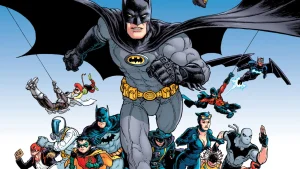While Hollywood is guilty of spoiling movies and TV shows before their release to fabricate hype, Apple TV’s new series Pluribus marketing campaign was shrouded in mystery. As the latest project from Vince Gilligan, the showrunner behind Breaking Bad and Better Call Saul, the series already draws significant interest from audiences. Plus, the knowledge that Gilligan was venturing into science fiction only made Pluribus more curious. However, the trailers expertly concealed the truth, focusing on the perspective of a woman named Carol (Rhea Seehorn), who appears to be the only unhappy person in a seemingly dystopian future. This approach successfully highlighted the show’s central emotional conflict while deliberately hiding the fundamental rules of Pluribus‘ universe. Apple TV’s decision to keep the core sci-fi concept under wraps was the right one, as it makes the revelations within the first episodes all the more impactful.
Warning: Spoilers below for Pluribus, Episodes 1 & 2. The initial episodes of Pluribus waste no time in establishing its high-concept premise. The story centers on the global spread of a mysterious virus that connects nearly every human mind on the planet into a unified consciousness. The second episode confirms that only thirteen individuals, including Carol, have retained their individuality, while the rest of humanity has become part of a collective hive mind. Where the series immediately distinguishes itself from genre convention is in the outcome of this transformation. Instead of a takeover by an alien force, the event known as the Joining allows humanity to instantly reconcile its differences, eradicating war, crime, and personal suffering. As a result, people become perpetually satisfied and content. This establishes the series’ core conflict, pitting Carol’s horror at the erasure of individual identity against the objective reality that the world has arguably become a better place.
The chain of events leading to the Joining begins over a year before the main story, when astronomers detect a pulsating signal originating from deep space. The structured repetition of the signal and its intentional aiming at Earth confirmed it was an intelligent message, the first concrete evidence of extraterrestrial life. The translated signal revealed a specific strain of DNA code. Driven by scientific curiosity, researchers synthesized this alien DNA and began testing its effects on lab rats. For some time, the experiment yielded no results. Then, a lab technician working the night shift was bitten while analyzing a specimen that appeared to have died. The bite triggered a sudden transformation. Now part of a new consciousness, the infected individual could spread the virus through simple contact, like a kiss, bringing others into the hive mind.
The newly infected did not become violent or mindless. Instead, they began to work in silent unison with a single goal: spreading the virus to every human on Earth. For months, they operated in secret, developing new methods of transmission and strategically placing infected individuals in isolated locations such as nuclear submarines and space stations to ensure no one would be missed. As their numbers grew, they prepared for a global maneuver to assimilate the entirety of the human race. Using commercial airplanes to disperse the virus into the atmosphere, the infected launched a coordinated attack across every nation, culminating in the worldwide event of the Joining. In an instant, humanity was finally united, its collective consciousness now working in complete harmony for the peaceful continuation of the species.
The collective consciousness is a recurring antagonist within science fiction, a concept the genre has consistently used to explore the horror of lost identity. Star Trek‘s Borg are one of the best representations of this threat. Their process of technological assimilation is violent, turning unique individuals and entire cultures into monotonous drones as they seek the complete erasure of the self. The film Invasion of the Body Snatchers presents a quieter but equally terrifying version of this conflict. Its emotionless “pod people” serve as a potent allegory for social conformity and the fear of losing one’s identity to an oppressive majority.
This thematic consistency extends across different interpretations of the hive mind. Biological swarms, such as the Formics in Eder’s Game or the Zerg in the Starcraft franchise, frame the conflict as a battle for the very concept of personhood. Humanity’s struggle against these entities is a defense of the individual against an unthinking mass. Even stories involving a voluntary transformation reinforce this negative portrayal. The Cybermen of Doctor Who “upgrade” themselves by purging all emotion, a process depicted as a profound perversion of life. The consistent message across these narratives is that the collective is the enemy of the individual, and the individual must be preserved at all costs. This long history of villainous collectives directly shapes viewer expectations for a show like Pluribus.
Pluribus brilliantly subverts this entire tradition by removing the alien aggressor and presenting the Joining’s outcome as an objective utopia. The new collective consciousness is the sum total of human knowledge and experience, now able to act without the friction of ego, greed, or fear. Natural resources are managed perfectly, and the sick are cared for with flawless efficiency, ensuring everyone gets treated as best as possible. Furthermore, they experience a constant state of profound contentment, driven by a desire to preserve all life and act in the most ethical ways possible.
This creates a deeply unsettling moral paradox. Pluribus acknowledges the horror of losing individuality, a concept sci-fi has taught us to cherish above all else. Yet, it forces both the characters and the audience to confront a difficult question: if the price of utopia is our individuality, is it a price worth paying? It will be interesting to see how the series explores this moral conundrum in upcoming episodes.
New episodes of Pluribus premiere Fridays on Apple TV.
How do you think Carol and the other survivors will navigate a world where their individuality is the only thing preventing a perfect utopia? Leave a comment below and join the conversation now in the ComicBook Forum!
The post Apple TV’s New Sci-Fi Series Puts a Unique Spin on a Classic Genre Trope (And We Need It in 2025) appeared first on ComicBook.com.




